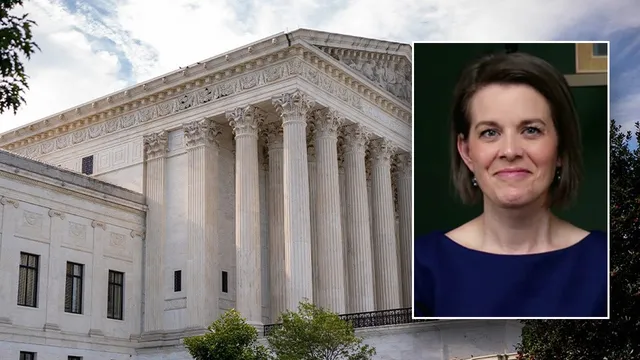
Maine lawmaker takes a stand against censure for trans athlete post
2025-05-20 18:49- Laurel Libby, a Maine state representative, has been censured for a social media post regarding a transgender athlete.
- The U.S. Department of Justice and Attorney General Pam Bondi have voiced support for her lawsuit against this censure.
- The case raises significant questions about constitutional rights and representation, particularly in the context of sports and gender.
Express your sentiment!
Insights
In Maine, state representative Laurel Libby has faced censure since February following her social media post that identified a transgender athlete who won a girls' pole vault competition. The post ignited a controversial debate around the participation of transgender athletes in women's sports. The Democratic majority in the state legislature voted to punish Libby by stripping her of her voting and speaking rights unless she issued an apology. In a significant development, Libby has filed a lawsuit challenging this censure, with support from the U.S. Department of Justice and Attorney General Pam Bondi, who argue that it undermines the rights of her constituents. Despite the pressure to apologize, Libby has publicly refused to do so, standing firm against what she perceives as a violation of her rights. Her case has now drawn attention to broader issues surrounding the treatment of transgender athletes in sports and the implications for women's rights. As the legal proceedings unfold, the situation continues to evoke strong opinions from various sides of the debate. The Supreme Court has granted an emergency injunction to Libby, allowing her to vote and speak in the legislature while her appeal is processed, signaling a potential shift in how such issues are addressed in the public sphere. The lawsuit is not only a test of Libby's rights as a legislator but also raises critical questions about legislative rules, First Amendment rights, and the foundational principles of representation in democracy.
Contexts
The participation of transgender athletes in sports has become a complex and highly debated issue within the realm of sports law. This topic has garnered significant attention due to the growing visibility of transgender individuals and the ongoing discussions on gender identity, equality, and fairness in competitive sports. Various governing bodies in sports, including the International Olympic Committee (IOC) and national federations, have introduced policies aimed at balancing inclusivity with competitive integrity. These policies generally outline eligibility criteria for transgender athletes, factoring in aspects such as hormone levels, transition periods, and the rights of cisgender athletes. However, differing standards across sports organizations have sparked controversy and legal challenges, compelling ongoing analysis and adaptation of laws related to sports participation requirements. Legislation surrounding transgender athletes varies widely from one jurisdiction to another, often reflecting broader societal attitudes toward gender identity. In some areas, laws have been passed to explicitly allow transgender athletes to compete in accordance with their gender identity, while in others, restrictions have been placed on participation, citing concerns about fairness and safety. This patchwork of regulations poses significant challenges not only for athletes seeking to compete but also for sports organizations attempting to enforce consistent and fair practices. Legal battles have erupted over state laws that limit access to certain sports categories based on assigned sex at birth, leading to increased scrutiny from both civil rights organizations and the broader public. The health implications of participation in sports for transgender individuals have also come under examination. Studies suggest that with proper medical guidance, including hormone therapies, transgender athletes can compete safely and equitably. However, the duration of hormone treatment and its effects on performance remain contentious points of discussion. A significant part of the dialogue hinges on the balance between ensuring competitive fairness and promoting inclusiveness. Advocates for transgender rights argue that excluding individuals from participation based on gender identity is discriminatory and undermines the principles of sportsmanship and equality. As we observe the evolution of sports law regarding transgender athletes, it becomes apparent that ongoing research, dialogue, and advocacy are essential to create frameworks that respect both individual rights and the spirit of fair competition. The conversations surrounding this topic are likely to develop in tandem with broader societal changes concerning gender identity and equality. It is essential for policymakers, sports organizations, and advocates to engage collaboratively to foster an environment that not only welcomes diversity but also upholds the integrity of competitive sports.